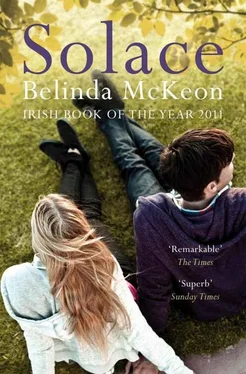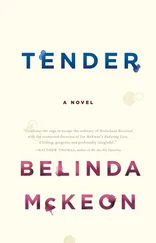He hoped the case would go the way she wanted. Not that he was entirely certain which way that was. She’d told him about the phone call to the old woman’s daughter, and about how she’d given a different version of their conversation to her boss; he’d been impressed by her gumption, but also more than a little uneasy about the whole thing. It wasn’t that Joanne wanted to protect the mother from the daughter, he thought, but that she wanted to protect the mother from herself, somehow. She’d been a dominating old shrew, and Joanne saw that, saw the madness in how the mother had behaved, trying to turn her daughter into some kind of Miss Havisham, or worse. She agreed that the mother was completely in the wrong. And yet she felt sorry for her. So she had hidden the things the daughter had told her and spun them into something else. She didn’t know why she had done it, she told him; it had just felt like the right thing to do. And he felt nervous about it. He’d felt nervous about it for the past month. He couldn’t see how it could possibly benefit her to conceal evidence like that — not just to conceal it, but to manipulate it — and he worried that it was going to backfire on her drastically, that her bosses would discover that she’d essentially tricked them out of calling a witness who sounded like she could be very valuable to them, with everything she had to say about the old woman; that he’d soon be seeing Joanne in bits, sacked, disgraced, shit-scared about her future. But nothing like that happened. It went completely the other way. Yes, she was in bits, after a week or so of the new workload, but she was in bits in the way that, according to her, was actually good for your career. If you were drained and pale and hollow-eyed, if you were all skin and bones, then you were doing something right as a trainee solicitor, it seemed; you’d go far.
It had to be to do with her own mother, he knew, all this stuff with the old woman and her daughter. A first-year psychology student could have worked that out. Mark didn’t ask her about her mother. He knew that he should. He knew that, whatever it was, the problem between them, the estrangement, it was painful — probably much more painful than whatever was going on between the other pair. He knew that if things got serious, they would have to talk about all of that stuff, but for now he just wanted them to get to know each other, to enjoy each other, without having to drag their families into it, without having to look at each other in terms of who their parents were, and what their parents had said and done.
And he knew he was being naïve. He knew he was procrastinating, as usual. Because the fact was, things were already beginning to feel serious between them. He found himself, constantly, thinking of things he wanted to tell her about, places he wanted to show her, things he wanted them to share. Even slogging through his thesis chapter over the last few weeks, he’d been thinking about her; wanting to talk to her about what he was finding in Harrington , about what Edgeworth was doing with form there, about what she was doing with the line between the real and the fabricated. Joanne was always too worn out, obviously, for him to inflict on her an excited monologue about Edgeworth and self-reflexivity and autobiographical interpolation, and about how she used these things to play with what people expected fiction to be, but he wanted to tell her anyway. He wanted to tell her about what he was working on now, as he waited for her to text, about what he was trying to concentrate on — about why Edgeworth’s irony in Castle Rackrent had backfired, about how everyone thought she was giving just a straight account of mad old peasants and ruined old estates, when in fact she was doing anything but. When, in fact, she was writing something so batshit insane, in technique and voice, that she barely even wanted it to be read as a novel at all. But Joanne would have other things on her mind. And, if he was honest with himself, he had other things on his mind. Though it was not yet four, he packed up his books and his notes.
As he walked down Dawson Street his phone vibrated in his pocket. The case must have ended early. But it was not Joanne, it was his mother, and he cursed as he remembered that he had agreed to go home this weekend. Now that the meadows were bare of grass, they needed to be spread with manure, and his father was wondering, his mother said, whether Mark would come for a couple of days and get the job done. So you’re literally asking me to come down to shovel shit, he wanted to say. But he just said that, yes, he would try to get down, and his mother had sounded so grateful that he’d felt more guilt than frustration as he hung up. Now he looked at the screen as it flashed again with Home . He didn’t answer. He stuffed the phone back into his pocket and stopped to look at the display in the bookshop window.
Joanne understood that he had to go down home sometimes. She had grown up on a farm. She knew what it was like. She knew what it was like to have a father who expected things. Though that was something else he had not asked her about much. It had come up a couple of times, usually when she was drunk and running off at the mouth a bit — which meant, he knew, that it was probably something she really needed to talk about, that it was on her mind, but it was territory he didn’t want to get into with her. Not while she was drinking. Or not while she was sober.
She seemed to have no idea of what had taken place between their fathers years ago. She showed no sign of knowing that they had been friends once, his father and hers, or something like friends, and that they had fallen out badly. But she would have been young when it happened; six years old, maybe, or seven. There would have been no reason for her to notice. It would not have mattered in her house the way it had mattered in Mark’s.
His father never talked about the Lynches now. He did not curse them. He did not articulate the things he felt about them. And his father was not, Mark thought, afraid of them. He just wanted to act as though he did not have to share a world with them. Yet that was impossible. He could not ignore them. And it did not take the sight of Lynch’s widow Irene, or of one of his sons, or of their big farm at Caldragh, or of their jeeps on the road, to remind his father of that fact. He needed only to drive half a mile over his own lane. He needed only to see the fields and the yard and the fallen-down cottage where, for nearly fifty years of his life, he had spent a large part of every day. Where he had worked with the man who had treated him like a son, old Tommy Burke; the man who had told Tom, always, that one day those fields and those gates and that cottage would become his own. It was the old story, Mark thought now, but it was a story that was never going to disappear. There was a book of essays by Declan Kiberd in the bookshop window; he stood and stared at it for a moment. It was a book he should have read. He thought about going in and buying it. But he had only thirty euro in his pocket and he needed it for the champagne. He walked on.
Tommy Burke’s farm up the lane had hardly been worthy of the name, just the cottage, with two or three rooms in it, and a few acres not much better than bog. Tommy was a bachelor, maybe thirty years older than his father. Mark could remember him only faintly — a flat cap, a battered old suit and battered old boots, a lot of rotten teeth, and a smell that became so familiar it was almost charming. Mark had never known what it was, that smell, until a few years ago when the smoking ban had come into effect and he had walked into a pub in the middle of the day and felt his nostrils twitch at the bang of stale booze, of spilled pints, of Guinness soaked into the carpet; the smells that there was no longer any smoke to hide.
Читать дальше












